The Intel Core i7-8086K Review
by Ian Cutress on June 11, 2018 8:00 AM EST- Posted in
- CPUs
- Intel
- Core i7
- Anniversary
- Coffee Lake
- i7-8086K
- 5 GHz
- 8086K
- 5.0 GHz
Benchmarking Performance: CPU Encoding Tests
One of the interesting elements on modern processors is encoding performance. This includes encryption/decryption, as well as video transcoding from one video format to another. In the encrypt/decrypt scenario, this remains pertinent to on-the-fly encryption of sensitive data - a process by which more modern devices are leaning to for software security. Video transcoding as a tool to adjust the quality, file size and resolution of a video file has boomed in recent years, such as providing the optimum video for devices before consumption, or for game streamers who are wanting to upload the output from their video camera in real-time. As we move into live 3D video, this task will only get more strenuous, and it turns out that the performance of certain algorithms is a function of the input/output of the content.
All of our benchmark results can also be found in our benchmark engine, Bench.
7-Zip 9.2
One of the freeware compression tools that offers good scaling performance between processors is 7-Zip. It runs under an open-source licence, is fast, and easy to use tool for power users. We run the benchmark mode via the command line for four loops and take the output score.
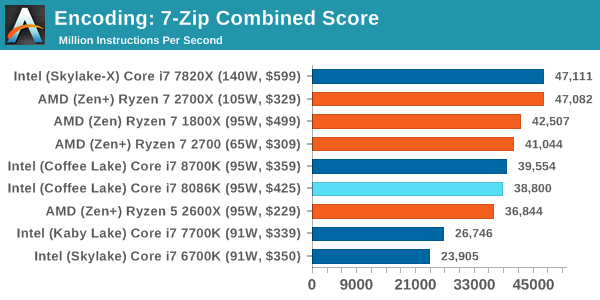
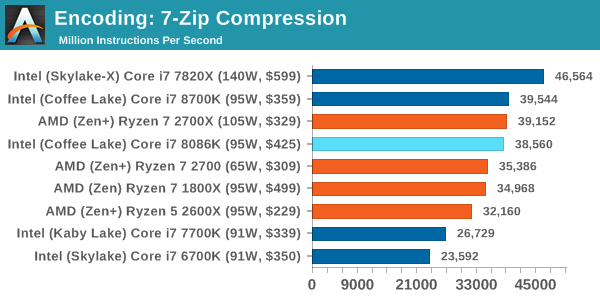
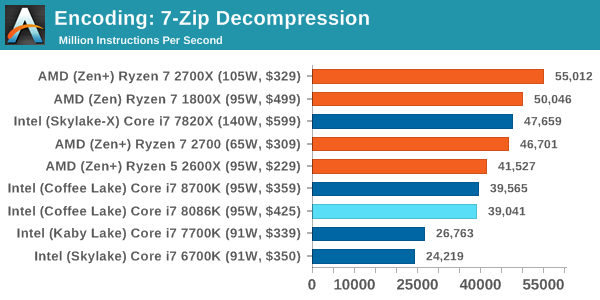
Again, trading blows with the 8700K, but falling behind a little bit.
WinRAR 5.40
For the 2017 test suite, we move to the latest version of WinRAR in our compression test. WinRAR in some quarters is more user friendly that 7-Zip, hence its inclusion. Rather than use a benchmark mode as we did with 7-Zip, here we take a set of files representative of a generic stack (33 video files in 1.37 GB, 2834 smaller website files in 370 folders in 150 MB) of compressible and incompressible formats. The results shown are the time taken to encode the file. Due to DRAM caching, we run the test 10 times and take the average of the last five runs when the benchmark is in a steady state.
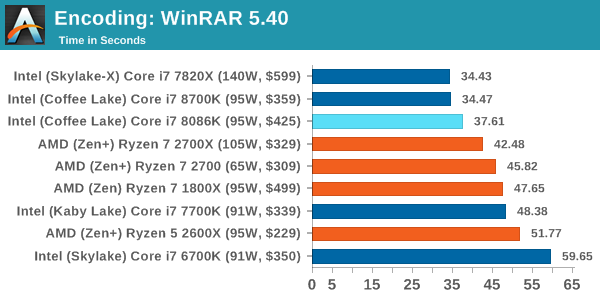
The 8086K takes another benchmark sitting behind the 8700K.
AES Encoding
Algorithms using AES coding have spread far and wide as a ubiquitous tool for encryption. Again, this is another CPU limited test, and modern CPUs have special AES pathways to accelerate their performance. We often see scaling in both frequency and cores with this benchmark. We use the latest version of TrueCrypt and run its benchmark mode over 1GB of in-DRAM data. Results shown are the GB/s average of encryption and decryption.
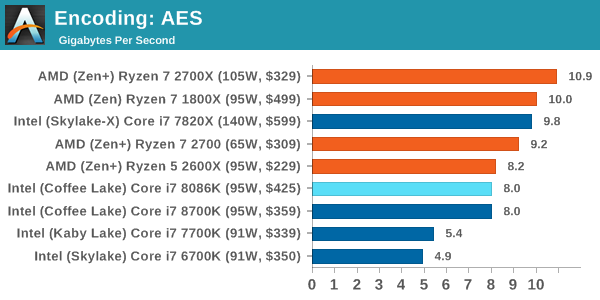
Under AES encoding we get literally identical results.
HandBrake v1.0.2 H264 and HEVC: link
As mentioned above, video transcoding (both encode and decode) is a hot topic in performance metrics as more and more content is being created. First consideration is the standard in which the video is encoded, which can be lossless or lossy, trade performance for file-size, trade quality for file-size, or all of the above can increase encoding rates to help accelerate decoding rates. Alongside Google's favorite codec, VP9, there are two others that are taking hold: H264, the older codec, is practically everywhere and is designed to be optimized for 1080p video, and HEVC (or H265) that is aimed to provide the same quality as H264 but at a lower file-size (or better quality for the same size). HEVC is important as 4K is streamed over the air, meaning less bits need to be transferred for the same quality content.
Handbrake is a favored tool for transcoding, and so our test regime takes care of three areas.
Low Quality/Resolution H264: Here we transcode a 640x266 H264 rip of a 2 hour film, and change the encoding from Main profile to High profile, using the very-fast preset.
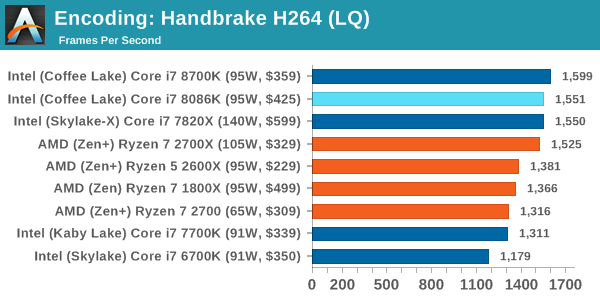
High Quality/Resolution H264: A similar test, but this time we take a ten-minute double 4K (3840x4320) file running at 60 Hz and transcode from Main to High, using the very-fast preset.
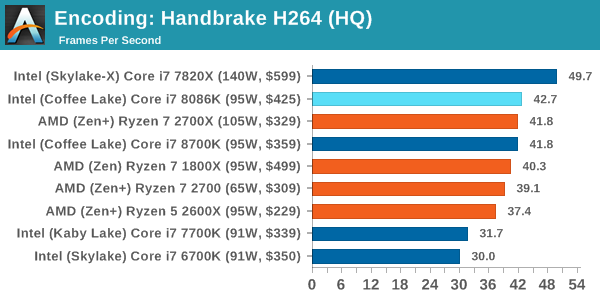
HEVC Test: Using the same video in HQ, we change the resolution and codec of the original video from 4K60 in H264 into 4K60 HEVC.
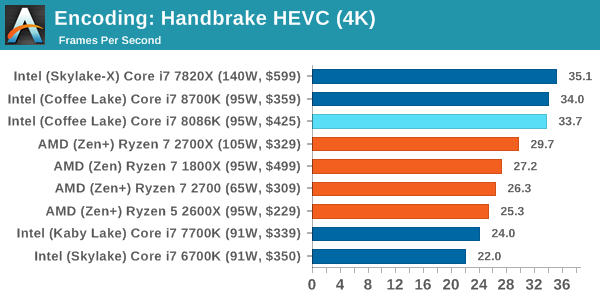










111 Comments
View All Comments
bug77 - Monday, June 11, 2018 - link
So what happened here? It looks like Intel's play with frequencies made this throttle more often. At least that the only explanation I can find for 8700k ending up better in so many tests.Tkan215215 - Monday, June 11, 2018 - link
As always its called milking and wallet ripper they know people still Buy them anywaybug77 - Monday, June 11, 2018 - link
I wasn't expecting this to be a cost-effective part, but rather a collector-oriented one.But mostly worse than a standard part is surely unexpected.
AutomaticTaco - Monday, June 11, 2018 - link
I don't think it's worse as much as the silicon lottery exists regardless of it. In other words, even among speed binned parts some OC better than others. And that's true for both the 8086K, the 8700K or any others.just4U - Wednesday, June 13, 2018 - link
I agree bug,I'd be very interested in this processor if it brought something to the table to justify it's cost. The 4790K did with a better thermal design. They could have added a kick ass cooler, or a factory delid and redo for better thermals. Something .. anything besides a small bump in clocks.
Drumsticks - Monday, June 11, 2018 - link
It might be milking, but I kind of have a hard time believing that. They're only making 50,000 of them, and only at about a 21% markup over the 8700k. But they're flat out giving away 16% of the chips. I doubt Intel is going to milk much money beyond their regular business from this. It's the companies 50th anniversary year, so I'm going to guess it's just positive fanfare and a collector's item related to that and it happening to be an anniversary for a well known processor at the same time.Old_Fogie_Late_Bloomer - Monday, June 11, 2018 - link
I enjoy hating Intel as much as the next guy but this is a good point.Revenue from 41,914 8086Ks: $17,813,450
Revenue from 50,000 8700Ks: $17,500,000 (at $350 apiece)
The remaining $313,450 doesn't really feel like a lot of money when you factor in binning the chips and dealing with all the other overhead of the promotion, especially since Intel isn't getting all of that money anyway.
SanX - Monday, June 11, 2018 - link
This was actually not the revenue but the PROFIT you blind people with easily effed brains. The production cost for this chip was probably less then 20 bucks. The processor in your phone is probably more hi-tech, has more transistors, more cores, and was made on more advances factories with 10nm litho being all sold below $25.mkaibear - Tuesday, June 12, 2018 - link
What are you smoking?His maths is bang on, although he neglects the cut the retailer will be taking off the top for that. They aren't making that much profit off each chip.
SanX - Tuesday, June 12, 2018 - link
They aren't making that much profit off each chip? If they aren't making huge profits then all mobile chip factories lose money by selling the same transistor count processors like the one in Apple or Samsung phones for just $25